Legends of Runeterra’s developers talk about balance, feedback, and what’s after open beta
Riot Games already has multiple expansions in the works and a solid plan for how they’ll address meta changes and feedback.
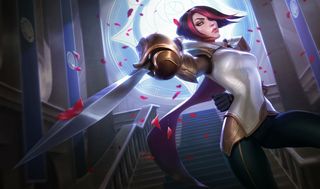
It feels pretty weird to be excited about a card game in 2020. After so many have risen and fallen over the years, Riot Games’ Legends of Runeterra—which blends League of Legends champions with Magic: The Gathering—launched in open beta last week. And, uh, it’s actually super fun and different? I know, I couldn’t believe it either.
A big part of that is Runeterra’s generous free-to-play progression, which ditches random booster packs, lets me purchase or craft cards directly, and adds a layering of progression systems that is throwing new cards at me faster than I can build decks with them. But wanting players to invest in another card game seems like a big ask. After so many have failed to sustain themselves for longer than a year or two, I wanted to sit down with executive producer Jeff Jew to talk about what Legends of Runeterra plans to do differently.
PC Gamer: I've been enjoying Runeterra a lot, but the one thing that I keep worrying about is, well, this isn't the first time I've played a new CCG and had a ton of fun only for the game to go belly up a year later. What are you planning to do differently to keep Runeterra something that I'll want to play a year from now?
Jeff Jew: I really empathize with that, I was a huge Duelyst player for a long time and I just saw it was shutting down. I loved that game, so I feel you on the apprehension around that. I think that one thing that we’re hoping comes through is that we’re treating Legends of Runeterra with the same level of service and commitment to it as we do League of Legends. I worked on League of Legends for many, many years, and our primary goal is to make sure that we were always listening and responding to players at a cadence that felt good to them. We want to bring all those lessons to legends of Runeterra, and hopefully that feels like a fresh take in this genre where the typical cadence you see is a large set [of cards] and then nothing for a long time.
We’re also working on multiple sets right now. I can’t go super deep into what those sets are or how many there are, but several of them are nearly done at this point.
Jeff Jew, executive producer
We’re committed to a monthly release cadence. I think players will see a lot of changes through the open beta that will hopefully make them feel like, oh wow, Riot is listening to us and bringing something fresh. Upcoming this year, when we add [the mobile version] along with some new features, that’ll have an impact as well. And we’re also working on multiple sets right now. I can’t go super deep into what those sets are or how many there are, but several of them are nearly done at this point. We’re balancing them still, we have a little art to do, but they’re real sets. We’re playtesting them. For us it’s focusing on servicing our players as much as possible, building that relationship and having those conversations, and we’re planning a multi-year roadmap right now.
So are you talking about balance patches and hotfixes in those monthly releases, or are we going to see cards and new features added monthly?
During the beta period we’re talking mostly about balance patching and fixing. Long term we do have some creative ideas in the pipe about what we can do to keep the game fresh month after month. In open beta, while we’re getting ready for mobile and the global launch, it’s mostly going to be balance updates and tweaks to the existing content. You will see new [cosmetics] in the coming months as well, but we’re going to have that large global launch that includes mobile shortly, so as people play they’ll see a lot more brought forth.
PC Gamer Newsletter
Sign up to get the best content of the week, and great gaming deals, as picked by the editors.
I think right now, the cool thing is with the way we’ve structured the progression systems, for the first month or so, the meta that you see today probably isn’t going to be the month-two meta even if we didn’t change any cards. Right now we’re in the kitchen-table card game mode—you’re playing with the cards you got, you’re buying some, but you’re also making due. So the make-due meta will transition into the full decks that everyone can build by the end of weeks three and four, and if you combine that with a monthly patching cadence, hopefully the game will feel differently week after week.
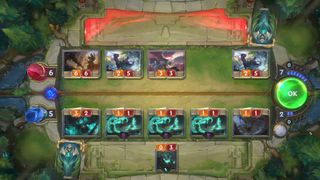
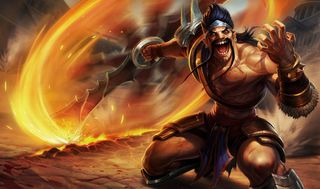
Instead of buying random booster packs, players earn resources through regular play and daily quests that levels up two rewards: the Region Road and Weekly Vault. The Region Road, of which there are six you can freely switch between, is like a free battle pass with incrementally better rewards as you level it up. The Weekly Vault offers rewards dependent on how much experience you earned each week. Check out our full guide to the economy here.
Was being able to shape the meta like that over time the reason why you decided to put a cap on how many cards players could buy each week?
I wouldn’t say that what we call the ‘slow meta’ was the leading reason. For us, the leading reason was, hey, it really sucks when you come into a card game and you get crushed by the S-tier deck day one. That was our primary driver. We also wanted to make the progression systems feel rewarding but fair. So slowing down that race did make that feel meaningful while also making the playing field a lot more fair for new players.
The nice side effect that we kept thinking about was that kind of slow meta progression. We will definitely listen to our players when it comes to whether that’s fun for them. I think there’s definitely different player types that we’re trying to service, we want the competitive, hardcore players to feel like this is the game for them—that’s why we introduced ranked mode really early. And that’s why, after a couple of weeks if you’re buying Wildcards, you can make an S-tier deck really quickly. But the side effect of the slow meta, if players like it, is something we can continue to do in future sets. But we’re looking to our audience to understand if that’s something they want to continue.
When you look at competing card games there’s almost always the same three modes: Ranked, drafting, and casual play. Are you planning to focus on sticking to the basics in terms of game modes or will you be adding some new ways to play, like Hearthstone’s Adventures?
We’re definitely looking towards the second one. We haven’t announced anything and for our players, especially before global launch, I don’t think they’ll see anything in the next few months. But we want to make sure that you feel like completing your collection is valuable, and we want to make sure that you always find new ways to play with the cards you earned. That’s a north star for us: Your collection matters. The way we do that is making sure that when you earn cards they’re always relevant, which is our commitment to live balance and progression, but also that you have different modes to play them in.
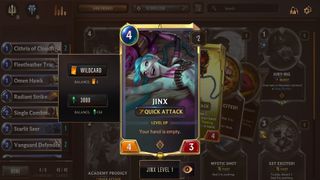
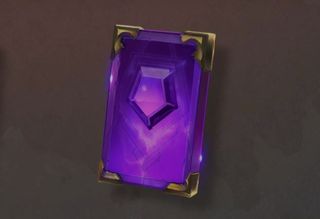
Instead of opening random booster packs, in Legends of Runeterra players earn Wildcards of a specific rarity. Each one can be redeemed for a card of your choice, so long as it matches that rarity. You can buy Wildcards directly, but there is a cap that resets each week.
We are actually in the early development of a few ideas for modes—nothing I can talk about today—but our goal is to make the game feel fresh and let you use your cards in different ways. The three modes you mentioned will always be the mainstay, but we’re exploring new game modes right now and will hopefully have something to talk about more deeply in the future.
Now that the open beta has been out for almost a week, what are some of the biggest concerns you're looking to address?
I’ll start with the 30 fps cap, which is really interesting. First of all, our team cared about that one deeply and there was a lot of debate internally on that. One of the reasons we kept it was we were trying to make sure that the experience between PC and mobiles feels consistent. But on our own machines here, a lot of our team were wishing they could uncap it on PC where you don’t have those same restrictions. We had someone working on it already, but when we got that feedback from the community our game director, Andrew Yip, grabbed those engineers and had a quick discussion and decided to commit to it.
For some of the other complaints, I think that the progression one is going to be the most polarizing. It’s the most painful for players who are used to dropping a hundred or two hundred dollars on a new set in a card game so they can play any deck they want. This can also be painful for streamers too, for example, who want to show variety. But right now we’re really trying to focus and make sure that every player, including all our free to play players, are having a great time. That is a pain point, but hopefully, especially after opening their first Weekly Vault and seeing how much they can get through doing the region roads and the quests, if they play for another week they can have that S-tier deck. Right now we’re trying to be patient. It would be easy for us to make a knee-jerk reaction and uncap the Wildcard limit we have, but it’s not the direction we want to go. Our axis is that this game is for everybody, and I think the path we’re on augments that.
We’re also seeing really good feedback about the deck builder and the pains that people have on UI elements. It’s all good feedback and those people are 100 percent correct. A lot of the feedback players have was already in a backlog [before open beta launch], we just didn’t prioritize it at first or some of it is new. A lot of our teams now have time to make quality of life changes. So on the deck builder side and the progression side, there’s a ton of internal dialogue—what do we prioritize? We’re still in beta, so we’ll continue to receive that feedback and once we fix it up and get it ready for players that’s when the global launch will begin.
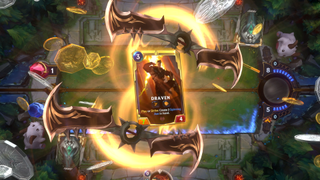
One thing I've been seeing a lot of people complaining about is the Elusive keyword. It seems like there's not really a natural counter to those types of units. What are your thoughts on that? Is it something Riot is looking to adjust, or is it a case where you feel like players just haven't developed the right strategies to counter it?
It’s a good question. I don’t think players are wrong and Elusive is a unique keyword and if you’re coming from a game like Hearthstone there is nothing like that. I do personally feel that it is an adjustment that players will have to make. Five days in is too early to look at the win rates of cards and make adjustments, we’d like to see how it shakes out in a week or so when everyone can make the deck they want.
I do think there’s a lot of natural predators to Elusive cards. There’s an abundance of Challenger units in Legends of Runeterra, which lets you attack Elusive units directly. There’s a lot of removal tools you have in Piltover and Shadow Isles decks—things like that. I do think that it’s maybe true that the starter decks cannot combat Elusive enough as they are, so if you’re just playing the starter decks, there’s probably not many tools to fight that.
Frelljord decks also have a lot. You can use Avalanche, you can use Frostbites. If you’re playing Demacia, you can really get beat up by Elusive if you’re not running Challenger cards, Judgement or Single Combat. But my hope is that this is something where the community can help course correct each other. What would we would hate to do is to knee-jerk react to that stuff and rob the players the satisfaction of figuring it out. There’s always a careful balance where we’re watching carefully from the side and we know there are answers out there, but if the players aren’t finding those answers a couple of weeks in or maybe if they do exist but it’s just not a fun play pattern, then we’ll take a look at it. It’s a tough design challenge, but we’re watching like a hawk. Five days in is definitely too early for us are making any changes.
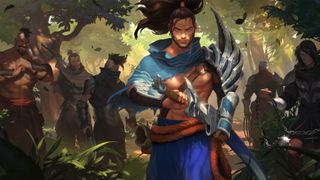
Because we’re not selling you random packs, we basically get away with not giving you cards that can’t be used in any deck.
Jeff Jew, executive producer
Speaking of strategy, what does a healthy meta actually look like to you? It seems like in every multiplayer online game, there's always a very loud portion of the audience complaining about it constantly.
We have high aspirations for this, and it might sound crazy. Our design team’s goal is that in every set of cards there are ten viable decks. Ten decks that can compete within a certain percentile of win ratio against each other. That’s a really high bar. I think in CCGs, three to five decks is the norm. But also in most CCGs, they don’t have the right tools: they’re on paper, or they’re unwilling to do the small tweaks and live balances to make that happen.
We may run the risk of changing too much. I don’t think that’s true, but if players are used to how CCGs have operated historically, seeing us change the game every month might feel too high.
Our goal really is to have ten decks of different faction combinations and feel that they are all viable and that no cards in our sets are filler. Because we’re not selling you random packs, we basically get away with not giving you cards that can’t be used in any deck. Even the basic cards have a place in a set. So for us, getting to that ten-deck meta is our dream. I don’t know if we will get there right away, but I think that aspiration will push us towards making sure the meta is fresh.
I’ve played a lot of competitive games, League of Legends and Magic: The Gathering, and I hear you. I’ve been guilty of complaining about the meta a lot, but I think when people are complaining about that—and I don’t want to put things in players’ mouths, this is my own opinion—I think it is that sense of staleness, that lack of creativity which is like, even if I was more creative, I don’t think I could come up with a solution to this problem. My hope is that by lowering the number of trash cards and getting win rates between different regions that feel good, players will feel like they just need to try a different combination. And if the meta is actually stale and three decks have high win rates or one card has a 100 percent play rate, they’ll have confidence that we’ll do something about it.
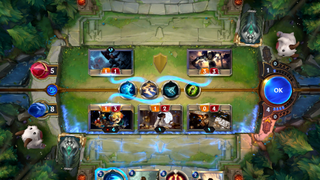
Sure, but no one likes to invest in a deck and have it nerfed. If there’s monthly fixes, aren’t you worried about constantly having to subject players to the pain of seeing a deck they’ve invested in get nerfed?
Actually one of the primary things we did when we started this game was to say that, hey, we want to have the ability to fix meta problems when we have an actual issue, which is different for other card games. The reason other card games cannot always do this, I think, is because most of the time players have spent a fortune trying to collect that deck. If you spent $50 or $100 to collect that deck, we’d be hesitant to change it because it’d make you feel really bad about it.
The reason why we went with this rewarding and generous progression system is because we felt like if players owned hopefully 60 or 70 percent of the set a few months in, then when we do touch the cards they do care about off that one deck they’re playing, they can just switch to a new deck because they have that collection. If we see in the data that a deck or card is winning too much, or there’s just overwhelming player sentiment regardless of the data that this isn’t fun to play against, we hope that if we do something about it that all players will have a deck they can switch to.
Portions of this interview were edited for length and clarity.
With over 7 years of experience with in-depth feature reporting, Steven's mission is to chronicle the fascinating ways that games intersect our lives. Whether it's colossal in-game wars in an MMO, or long-haul truckers who turn to games to protect them from the loneliness of the open road, Steven tries to unearth PC gaming's greatest untold stories. His love of PC gaming started extremely early. Without money to spend, he spent an entire day watching the progress bar on a 25mb download of the Heroes of Might and Magic 2 demo that he then played for at least a hundred hours. It was a good demo.
Most Popular


